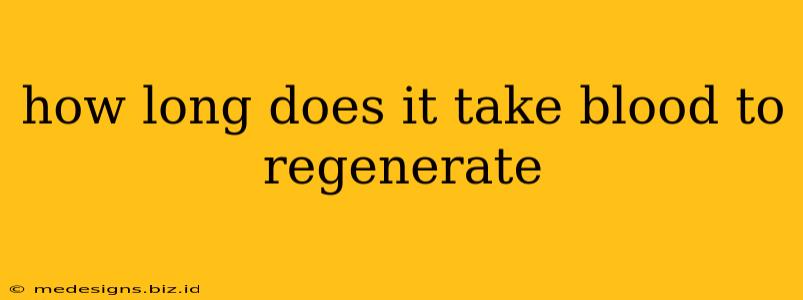How Long Does it Take Blood to Regenerate? Understanding Your Body's Amazing Repair System
The question of how long it takes blood to regenerate isn't straightforward. It's not like a cut that heals over a few days; blood regeneration is a continuous, complex process involving several different types of blood cells. The time it takes to replenish depends on several factors, including the type of blood component and the extent of blood loss.
Understanding Blood Composition and Regeneration
Blood is a vital fluid, carrying oxygen, nutrients, and hormones throughout the body. It's composed of:
- Red blood cells (RBCs): These carry oxygen. They have a lifespan of about 120 days, after which they are naturally broken down and recycled by the spleen and liver. Your bone marrow continuously produces new RBCs to replace these.
- White blood cells (WBCs): These fight infection and disease. Their lifespan varies greatly depending on the type of WBC and the body's needs. Some live for only a few days, while others may live for months or years. Bone marrow is crucial for the production of WBCs.
- Platelets: These are essential for blood clotting. They have a lifespan of about 7-10 days, and your bone marrow constantly produces new platelets.
- Plasma: This is the liquid component of blood, carrying various proteins and other substances. Plasma is constantly recycled and replenished.
Timeframes for Blood Component Regeneration
Given the different lifespans and roles, there's no single answer to how long it takes for blood to regenerate. However, we can look at specific components:
- Red Blood Cells: The body's capacity to replace lost RBCs is remarkable. Minor blood loss is usually easily compensated for within a few days to weeks. In cases of significant blood loss (e.g., during surgery or trauma), it can take weeks or even months to fully replenish red blood cell levels. This recovery depends heavily on individual health, nutrition, and the severity of the loss.
- White Blood Cells: WBC regeneration depends on the type of white blood cell and the cause of depletion. In cases of infection, the body will rapidly increase WBC production. However, recovery from conditions that suppress WBC production (like some cancers or autoimmune diseases) can be much slower and may require medical intervention.
- Platelets: Similar to RBCs, minor platelet loss is usually replaced quickly. However, significant platelet loss requires more time for full recovery, and medical intervention may be necessary. This recovery can take several days to weeks depending on the circumstances.
Factors Affecting Blood Regeneration Speed
Several factors influence how quickly your body regenerates blood:
- Severity of blood loss: The more blood lost, the longer it takes to replenish.
- Underlying health conditions: Individuals with pre-existing health conditions such as anemia or bone marrow disorders may regenerate blood more slowly.
- Nutrition: A balanced diet rich in iron, vitamin B12, and folate is crucial for blood cell production.
- Age: Older adults may regenerate blood more slowly than younger adults.
When to Seek Medical Attention
While the body is remarkably efficient at regenerating blood, significant blood loss requires medical attention. Symptoms such as dizziness, weakness, rapid heartbeat, and shortness of breath indicate a need for immediate medical evaluation.
In summary, there's no single answer to how long it takes to regenerate blood. It's a continuous process, and the time required depends on many factors. Maintaining a healthy lifestyle with a balanced diet and seeking medical attention for significant blood loss are crucial for optimal blood regeneration.
